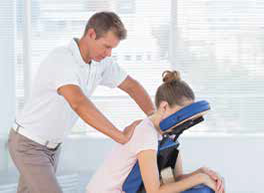
Strenuous exercise creates minuscule muscle tears. In response, your body releases cytokines, which create inflammation as a by-product of your muscles trying to repair themselves. Recent research has demonstrated that massaging muscles after they have been worked to full exertion helps reduce the body’s production of those inflammation-causing chemicals, which theoretically means less post-workout soreness. What’s more, massage can increase the production of cell mitochondria, which contribute to cell repair—a process that may also be a potential source of pain reduction.
In general, a pleasurable massage results in increased activity of serotonin and increased production of endorphins and dopamine, all positive brain chemicals. They elevate mood and indirectly contribute to feeling better by helping to improve sleep and reduce feelings of stress, depression and anxiety.
For lower back pain and muscle spasms caused by soft tissue injury (such as a muscle strain), neuromuscular massage therapy—also called trigger-point myotherapy—can be effective. This kind of massage involves the physical therapist applying deep pressure in one spot at a time for about 10 to 30 seconds. This technique forces the muscle to release lactic acid, a chemical that prevents proper blood and oxygen flow. Improved blood and oxygen movement means faster and better muscle healing. But trigger-point myotherapy should only be performed by a trained professional.
Massage may be less helpful, however, for the phenomenon known as delayed-onset muscle soreness (DOMS). DOMS often occurs after you’ve worked muscles in unfamiliar or especially strenuous ways; the muscles don’t begin to hurt until some time (roughly eight to 24 hours) has passed. The soreness can then linger for one to three days.
If you have muscle soreness you suspect might be relieved by massage therapy, come in for an evaluation. We can create an individual therapy plan for you that includes massage to substantially ease your pain—and, just as important, help prevent future injuries.









